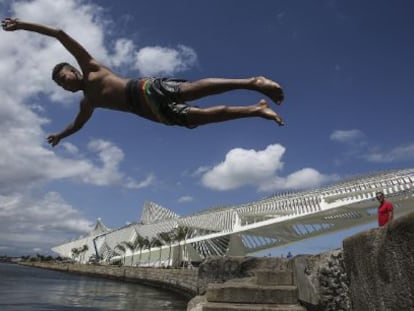Dilma Rousseff condemns “coup” in Brazil
"They have invaded the government like a horde of Huns," says ousted president of her interim successor Michel Temer and his allies


Suspended as Brazil’s president and accused of fiddling the books to conceal the true state of the country’s economy, Dilma Rousseff is cooling her heels in Brasilia’s Alvorada Palace where colorful birds flit through the exotic gardens and two waiters lurk with a trolley of coffee. The atmosphere is peaceful and, in the absence of civil servants and secretaries, it feels as though Rousseff is not only in limbo but secluded. It’s a workday in a country in crisis but it feels like a Sunday here.
The interview takes place in the palace library where Rousseff poses for the obligatory photos and cracks jokes. She seems in much better form than several months ago when she was still at the helm. This observation makes her laugh.
“What you really want to say is, ‘Why aren’t you hopping mad?’ Isn’t it?”
Question. I would like to know why you don’t seem more defeated.
Answer. Because I’m fighting for my rights. When you feel you’ve been the victim of a plot, fighting back gives you a focus. I know I’m in the right and they’re not. The political system in Brazil is in a state of collapse.
By “they”, she means the interim leader Michel Temer and his new government. On May 13, Dilma Rousseff was forced to leave her presidential headquarters at the Planalto Palace as an impeachment trial for her got underway in the Senate.
My return is not just about my mandate but also about reconstructing democracy in Brazil. You have to ask the people what they want. I’m not saying that if I return there will be democracy Djilma Rousseff
The trial will probably end in the middle of August with a definitive outcome. Until then, Rousseff is participating in debates and making public appearances as well as maintaining a presence on social networks. She is also preparing her defense and her return to power, which has become something of an obsession.
When asked about Temer, her old ally who she now refers to as “traitor” and “captain of the conspiracy”, her face hardens. “They have invaded the government like a horde of Huns,” she says.
Q. Why?
A.You can’t just go into government and throw out promises made in an election manifesto voted in by 54 million people. They want to reform pensions without taking inflation into account. And they want to privatize Petrobras…
Q. So far they haven’t actually done any of this…
A. But they want to. They want to wash their hands of Pre-Sal [state-owned, oil-asset management company] and change the system to benefit big companies. And they want to change our policies on education and health. They have no power to do so but they already have a measure in Congress that would affect these sectors for the next 20 years.
The trial will probably end in the middle of August with a definitive outcome
Q.What measure?
A. Limiting the budget in health and education to what it was the previous year plus inflation. But Brazil is a country with an increasingly young population. So this measure will effectively reduce the education budget per capita.
Q. But the markets seem to have stabilized.
A. You think so? I think the markets are pretty realistic and up to now they have hardly been euphoric. This government has already had three ministers thrown out and there’s one more on his way – all for corruption. And that puts the government in an awkward position. It’s meant to have come to the country’s rescue but in fact it’s a case of each man for himself.
Q. Do you think you’ll be able to make a come back?
A. It’s crucial that I return. I am using the power of debate to get rid of the enemies of democracy. You have to be clear about what’s at stake here. It’s not just an impeachment. The political system in Brazil is in a state of collapse. The President of the Chamber, Eduardo Cunha, has been removed from the post. The Attorney General has asked that the President of the Senate Renan Calheiros be sentenced to prison. My return is not just about my mandate but also about reconstructing democracy in Brazil. You have to ask the people what they want. I’m not saying that if I return there will be democracy. I am saying democracy dictates my return, because my mandate was legitimate and his isn’t.
Q. But when the impeachment procedure began, you were enormously unpopular and there were massive demonstrations against you.
This government has already had three ministers thrown out and there’s one more on his way – all for corruption Djilma Rousseff
A. But I won 54 million votes. In any other country, unpopularity doesn’t mean elections.
Q. But what would you do differently if you returned to power now?
A. First of all there will be no more deals with this coalition [Michel Temer’s party and Eduardo Cunha and the other parties that voted in favor of her impeachment]. If I return, we will have to discuss the possibility of political reform.
Q. And why didn’t you do that before?
A. I tried in 2013 without success.
Q. When did you realize there was no way out of the impeachment?
A. We fought it to the end. I didn’t realize it was inevitable until then. But it was my duty to fight it as long as I could.
Q. Is that why you wouldn’t quit?
A. I didn’t quit nor will I ever quit because I’m living proof that there has been a coup in Brazil.
Q. How did you feel after the first day of the impeachment?
A. I don’t remember in detail. We worked all day. We had several interviews and I talked with various people. And since then it’s been non-stop. I work pretty hard. Last week I was in Paraíba, in Bahía and in Pernambuco. And I have my exercise routines. I go out on the bike in the morning. I’m not depressed. I’m not that kind of person. And I’m not going to rest until I return to power.
English version by Heather Galloway.
Sign up for our newsletter
EL PAÍS English Edition has launched a weekly newsletter. Sign up today to receive a selection of our best stories in your inbox every Saturday morning. For full details about how to subscribe, click here.
Tu suscripción se está usando en otro dispositivo
¿Quieres añadir otro usuario a tu suscripción?
Si continúas leyendo en este dispositivo, no se podrá leer en el otro.
FlechaTu suscripción se está usando en otro dispositivo y solo puedes acceder a EL PAÍS desde un dispositivo a la vez.
Si quieres compartir tu cuenta, cambia tu suscripción a la modalidad Premium, así podrás añadir otro usuario. Cada uno accederá con su propia cuenta de email, lo que os permitirá personalizar vuestra experiencia en EL PAÍS.
En el caso de no saber quién está usando tu cuenta, te recomendamos cambiar tu contraseña aquí.
Si decides continuar compartiendo tu cuenta, este mensaje se mostrará en tu dispositivo y en el de la otra persona que está usando tu cuenta de forma indefinida, afectando a tu experiencia de lectura. Puedes consultar aquí los términos y condiciones de la suscripción digital.










































